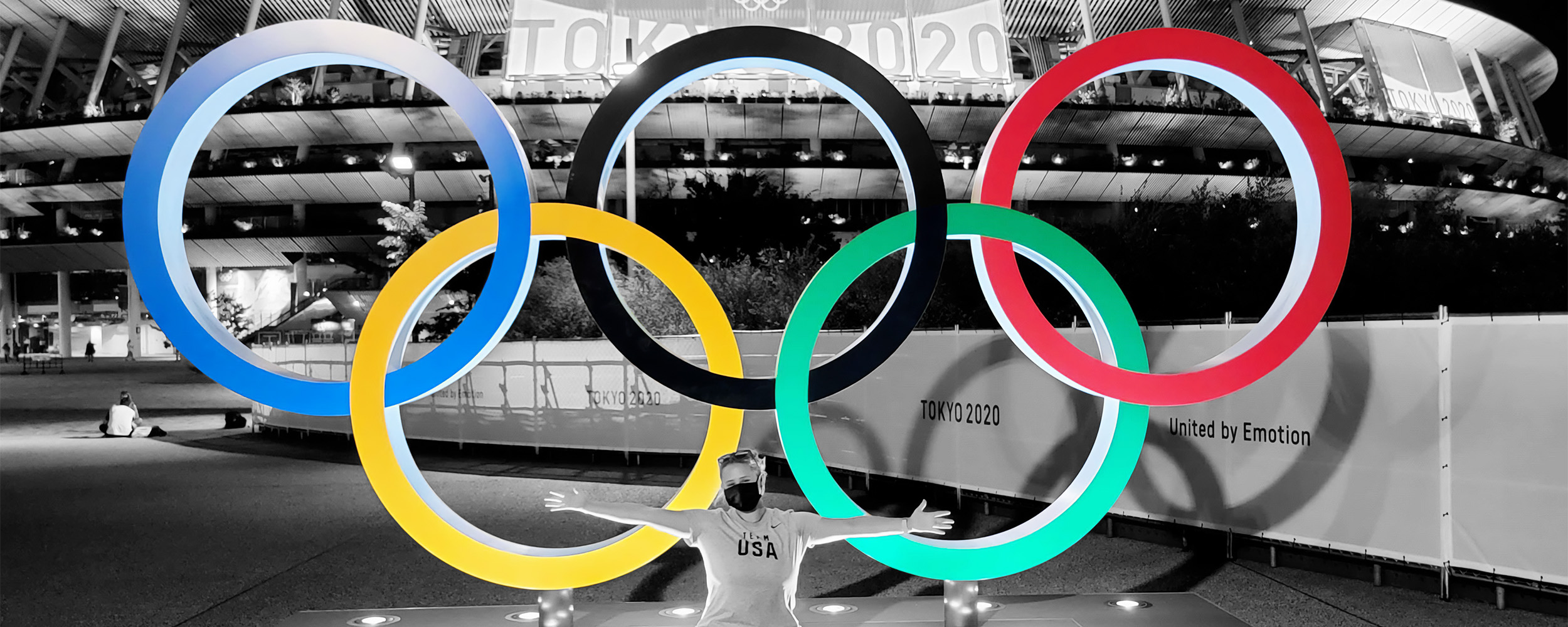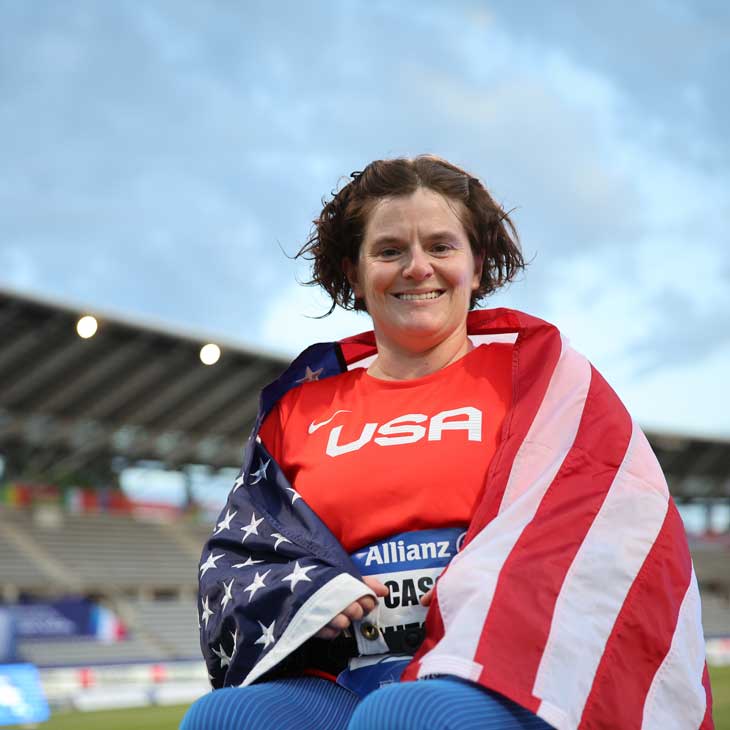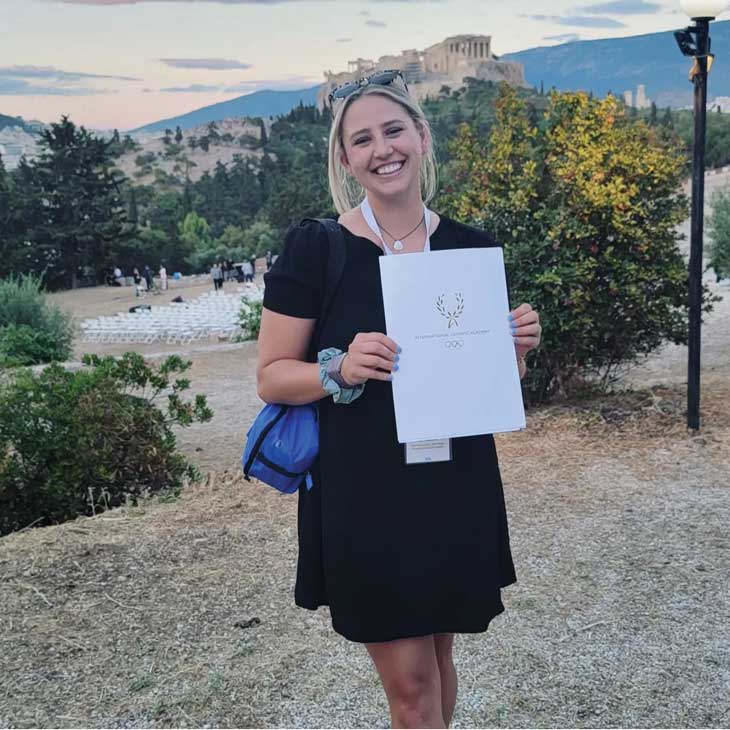
Olympic Cowgirls: OSU alumnae prepare for Paris Games
Wednesday, May 8, 2024
Media Contact: Mack Burke | Associate Director of Media Relations | 405-744-5540 | editor@okstate.edu
Paralympian’s Perseverance
Mitchell looks to make fourth Paralympic Games 25 years after life-changing diagnosis
Cassie Mitchell has always found a way to adapt.
No matter what obstacle was placed in her way. No matter what new diagnosis she got from the doctor. No matter what age people are supposed to stop being Olympians, she doesn’t stop pursuing her ambitions.
If she did, her competitive career would have ended almost before it began, back when she was 18.
First Diagnosis
Mitchell grew up in Warner, Oklahoma, and played sports for her entire life.

She rode horses, winning world titles in Western speed events, like barrel racing. She even had a track scholarship to college in Missouri, but before she could even get on the campus blacktop, she became paralyzed.
In 1999, she was diagnosed with an autoimmune disease called Devic’s neuromyelitis optica, which causes painful muscle spasms and inflammation around the spinal cord and optic nerves.
Mitchell changed colleges, deciding on Oklahoma State University for its engineering program, eventually graduating in 2004 with a degree in chemical engineering.
But, when she first arrived as a freshman, she was still getting used to her wheelchair. One day, when she was making the trek to the engineering building, she was approached by Ken Lee, who was OSU’s wheelchair basketball coach. He asked her to attend the team’s practice; the rest soon became history.
“I became an All-American as a college wheelchair basketball athlete,” Mitchell said. “But as my disability progressed, it’s a progressive neurologic disability, I was not able to continue in basketball. I had to switch sports for something that would be better for someone who had impairments in all four limbs.”
Mitchell said she shot remarkably well while she was playing basketball, making 80% of her free throws and 42% of her 3-point attempts. Everything is the same for wheelchair basketball as it is for traditional basketball, right down to the height of the rim, so she performed at a high level while seated.
Back when Mitchell was still playing basketball, she also met former men’s basketball coach and OSU legend Eddie Sutton.
“There was a lot of positive momentum for basketball during that time,” Mitchell said. “I actually have a basketball signed by Eddie Sutton that says, ‘Always have faith in God, yourself and the Cowboys.’ He signed that for me when I got the Goldwater Scholarship at Oklahoma State, and that happened at the same time I had gotten All-American for wheelchair basketball.”
First Olympics
Because her disease progressed, Mitchell was no longer able to shoot the basketball like she had been, and had to find a new sport.
She ended up choosing track and field and went to the London 2012 Paralympics. There, she won fourth place in each event she competed in: the women’s 100-meter, 200-meter and discus.
Originally, Mitchell was disappointed that she didn’t medal, but after getting off the subway, she had an experience with a fan that she said was one of the most memorable moments she’s had from competing in the Paralympics.
“A young kid in a wheelchair came up to me,” Mitchell said. “He knew my name, what kind of racing wheelchair I had and he just looked at me. Then he said, ‘I want to be just like you when I grow up.’ I melted, and I signed an autograph for him. It didn’t matter to him that I had just gotten fourth.”
Mitchell was amazed to realize the kind of impact she and other similar athletes were making on people’s lives around the world.
Mitchell’s original motivation to keep training came from wanting to stay fit, but now she says she is also driven by a love for her country. She wasn’t able to serve in the military but said she admires those who have, and being a part of the Paralympics gives her a chance to serve her country in a different way.
“To wear a USA uniform and have a flag on my chest, it’s just an amazing feeling,” Mitchell said.
New diagnosis, more Olympics
Not only does Mitchell have a progressive neurologic disability, but she also has leukemia.
She’s been dealing with it since back in 2016 and continues to fight it today. She said she remembers the London games fondly because of the exciting atmosphere and the thousands of fans, but the Rio Paralympics forced her to take more care.
“I had to be cautious because I was only a few months into chemo,” Mitchell said. “I had just gotten out of the hospital right before I went to the trials, and I had to pull myself out of the hospital for the Olympic trials and then go back for treatment. It had its own challenges, but I got my first medal.”
Her first medals in Rio were a bronze in the women’s club throw and a silver in the women’s discus. She also competed in swimming, where she got seventh place in the women’s 50-meter backstroke. In the Tokyo 2020 Paralympics, she won a silver medal in the women’s club throw and fourth in the women’s discus.
Mitchell hasn’t won a gold medal yet, but she is working hard to pursue that goal for the Paris 2024 games.
“I am putting in the effort and the training, and I foresee myself being in medal condition for Paris 2024,” Mitchell said. “Obviously, no athlete is going to say their goal is to get the bronze. No, the goal is always to get the gold. That’s the goal. Nobody sets the bar lower.”
Although Mitchell, 42, recognizes that she’s getting older, she hopes to hold out for the Los Angeles Paralympic Games in 2028 so she can compete on U.S. soil.
‘Never giving up’
“... ‘Never, never, never give up.’ It’s attributed to Winston Churchill. That is my message. It applies to everyone, it doesn’t matter whether you’re permanently disabled, or you just broke your leg and it’s temporary, or if you have a cancer diagnosis or if you’re just having a bad day. You have to have a mindset that you’re not giving in.”
On top of being a Paralympian, Mitchell also works as an associate professor in biomedical engineering at Georgia Institute of Technology and Emory University School of Medicine in Atlanta. She received graduate degrees in biomedical engineering from both universities.
Mitchell’s message to her students, others with disabilities and the world is to be thankful for what you have and never give up.
“I have in my house, in my office, in my research lab and basically everywhere a sign that says ‘Never, never, never give up,’” Mitchell said. “It’s attributed to Winston Churchill. That is my message. It applies to everyone, it doesn’t matter whether you’re permanently disabled, or you just broke your leg and it’s temporary, or if you have a cancer diagnosis or if you’re just having a bad day. You have to have a mindset that you’re not giving in.
“You can let yourself bask in the misery for a little bit, you know, that’s human, and believe me, I’m human. But you have to be able to pick yourself up and have the mental toughness to say, ‘I’m not giving in to this adversity.’”
Spreading the Word
Schultz brings Olympians’ stories to the digital age
Hannah Schultz, a graduate of Oklahoma State University’s sports media and strategic communications programs, is now at the forefront of American athletics as director of brand strategy for the United States Olympic & Paralympic Committee. (USOPC)
Schultz’s passion for sports was nurtured early. Hands-on internships with the OSU Athletics Department, former WNBA franchise Tulsa Shock and Oklahoma City Thunder solidified her career path. She said OSU’s supportive community and the School of Media and Strategic Communications equipped her with the skills and confidence to pursue her dreams.
“My experiences with the sports media program exposed me to working professionally in sports so early, I feel like I had a leg up in breaking into the sports industry,” Schultz said. “Oklahoma State also gave me well-rounded people skills.”
Now at the USOPC, Schultz focuses on revitalizing Team USA’s brand. She emphasizes the Olympic and Paralympic movement’s core values: fostering unity and celebrating diversity through sports.
One of her job’s challenges is that Olympic viewership has declined, and navigating the ever-evolving digital landscape adds complexity. But Schultz views these as opportunities to innovate and connect with fans in new ways.
“It’s challenging and really interesting and fulfilling to dive deeper into how these changes have affected the way we tell athletes’ stories and connect with fans,” Schultz said. “It’s both a challenge and an opportunity for us because the ultimate goal is to bring new fans in to support Team USA athletes. The changing landscape is going to continue, so we’re learning to be flexible and adjust our tactics where we need to.”
Her vision is to make Team USA a household brand. This involves showcasing athletes’ journeys and personalities beyond the games, making them relatable to fans of all backgrounds.
The upcoming Olympic and Paralympic Games Paris 2024 offer an exciting platform to re-engage fans. Schultz highlights the presence of spectators, the cultural richness of Paris and the potential to attract new audiences.
“The city of Paris is really excited to host these games, and they’ve been very welcoming to us,” Schultz said. “We’re thinking about planning experiences for fans and athletes, and we’re looking into different ways we can leverage the cultural aspects of Paris as it relates to the content and coverage of the games.”
Empowering athletes is also crucial for Schultz. She recognizes the power of individual stories and believes in supporting athletes to share their journeys and build their brands.

Schultz has a great enthusiasm for sports and a dedication to Team USA. She finds fulfillment in seeing her work come to life at events, supporting athletes and contributing to a brand that reflects the nation’s spirit and diversity.
“You can’t really compare Team USA to another team,” Schultz said. “Team USA is more diverse than any professional or collegiate teams in the U.S. That’s something we’re really proud of, and we feel that Team USA is a representation and reflection of our nation. We feel this makes our team and brand relatable to anyone, whatever sport they like, whatever their background and heritage. If we’re showing up consistently, we’ll have a story that’s going to attract a new fan.”
For aspiring sports marketing professionals, Schultz’s advice is simple: seize opportunities and actively engage early. She said passion and dedication can pave the way to a fulfilling career in this field.
“I think a lot of people are always looking for the perfect job, title or position,” Schultz said. “But really, I think you can wear a brand strategy hat in any role or opportunity that presents itself.”
Schultz originally played basketball and softball but decided she didn’t want to pursue sports long-term. She decided the next best thing would be working in the sports industry, which is what drove her to OSU. One of the things that pushes her to keep going in this profession is the opportunity to support U.S. athletes on the world’s largest stage.
“The stories across Team USA are ones that captivate you and bring you in,” Schultz said. “I never thought I would be a wrestling or goalball fan. There really is so much to explore with Team USA. Even being on the inside, I’m learning something new every day. I’m growing the variety of opportunities that I have, and it keeps me coming back for more.”
Photos: Provided, Marcus Hartmann and Mark Reis
Story by: Mak Vandruff | STATE Magazine
